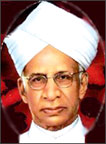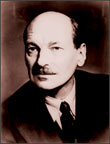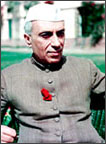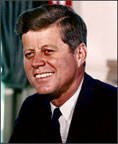Reason, not emotion - the springboard to effective constitutions

In a world of profligacy and bigotry, reason stands no chance. World
systems with its accompanying institutional layout stand ill-fated not
of its own making but due to the grand folly of those that handle all of
such, who in the midst of discharging their duties, lose sight of the
higher purpose or the broader perspective by being shrouded in emotion.
For instance the Nation State concept with its characteristics of
territorial integrity and sovereignty, taken on its own merit carry high
ideals yet meander due to man's restricted thinking based on an
inflammable emotional state.
 |
 |
 |
 |
| Dr. S. Radhakrishnan |
Clement R. Attlee |
Jawaharlal Nehru |
John F. Kennedy |
Territorial integrity and people's sovereignty are both at stake when
restricted constitutional arrangements come into play which arrangements
however narrow could be overcome only when morality overtakes what is
technical. Yet to find the moral capital that will shed the emotional
baggage is hard to come by as the social whole is progressively overcome
by this baggage containing race, caste, religion, school, club, family
whatever. Profligacy and bigotry runs high in such environs.
Only ultra nationalistic tendencies and ethno-populist views - all
part of such emotion remain, whereby people's sovereignty is taken to be
the wishes of the majority. People's sovereignty is an all inclusive
concept - that which includes all social segments. People's sovereignty
is defunct amid ethnic disarray and economic deprivation. In such
environs, such sovereignty slides down the precipice.
Again, in such surroundings, the concept of territorial integrity is
also lost. Ethno/religio/economic/political marginalisation while
undermining people's sovereignty put territorial integrity at jeopardy.
Territories are exposed to what is unwholesome when discriminated,
disgruntled social segments begin to tear the national fabric and align
with external forces. More important then the need for State
dispensation of equality and equity among all social groups.
Constitutional arrangements and institutional layouts are thus more
into emotional state than what appeals to moral conscience.
Historical fact
The five kingdoms of ancient Sri Lanka including the Jaffna Kingdom
was a historical fact - the fiction of today. In the absence of
constitutional arrangement there was reasonable acceptance of
social/political diversity. Yet that state of reason in later years ran
into emotional haywire amid misinterpretation of modern constitutional
arrangements. Such mechanisms in its ideal state should facilitate
reason yet we see such reason operative, ironically though, only in
pre-colonial times, devoid of any prescribed constitutional involvement.
If constitutional misinterpretation is dangerous, far worse is the
havoc coming out of a rigid constitution. India's liberal democrat,
scholar and thinker Prime Minister Jawaharlal Nehru said, "A
constitution to be living must be growing, must be adaptable, must be
flexible, must be changeable. And if there is one thing which the
history of political development has pointed out it is this. The great
strength of the British people has resided in their flexible, unwritten
constitution. They have known how to adapt themselves to the biggest
changes, constitutionally. The extreme of a rigid constitution is a
dangerous one, which might lead to the break up of that constitution.
Life - a curve
Life is a curve-it is not a straight line and the life of a nation is
even more of a curve in these changing times. Logical and straight lines
are tangents which go off the curve and if the tangent is too far away
from the curve of life and the curve of a nation's life, then there is
conflict and upheaval.Something new emerges because you come back, as
you must, to the line of life because you cannot depart too far from it.
So if you are flexible in your action and constitutions then you are
nearer to the living curve of a nation's life."
A constitution which is unchanging and static - it does not matter
how good it is, how perfect it is - is a constitution that has outlived
its use."Nehru's reference to changing times comes within the
comprehending powers of the Buddhist mind whose religious ideology is
based on change itself - the Dhamma chakra or wheel - so symbolic of
everything in the world that does not escape this universal truth.
Invariably, constitutional changes then should not perturb nor
instill fear in such minds. Constantly living with a fear that power
sharing would ultimately lead to separation and continuing to remain in
that thought itself is ingredient to and facilitator of a separate
State. It was Jawaharlal Nehru in one of his finest expressions who
declared "Peace can only come when the causes of war are removed."
Wars don't enrich
British Prime Minister Clement R. Attlee - the liberalist if not for
whom the British colonies may have continued as subjugated entities
under Winston Churchill speaking at the ILO conference in 1941 said,
"The fact is that wars do not enrich but impoverish the world and bold
statesmanship will be needed if we were to repair the ravages of war and
to ensure to all the highest possible measures of labour standards,
economic growth and social security."
India's eminent scholar/statesman Dr. S. Radhakrishnan at a meeting
in New Delhi in 1962 said, "If the varied economic, social, cultural and
political institutions which affect the whole world are to be saved from
collapse, the re-inforcement of multi-cultural understanding and
spiritual fellowship among all people is an imperative necessity.
Men have existed side by side for centuries. They must now not merely
exist together, but live together, understand one another and love one
another."
US President John F. Kennedy in his address to the UN in 1961 even
expressed his desire to see a world where the rule of law over took the
rule of war.Kennedy even saw the future dangers arising out of a
unipolar world. Inequality and inequity he viewed as threatening world
peace.
Development can become a co-operative - not a competitive enterprise
to enable all nations however diverse in their systems and beliefs, to
become in fact as well as law free and equal states.
Yet, all of the above personalities' thirst for enlightened
governance cannot come about as long as narrow self-serving interests
prevail. |
